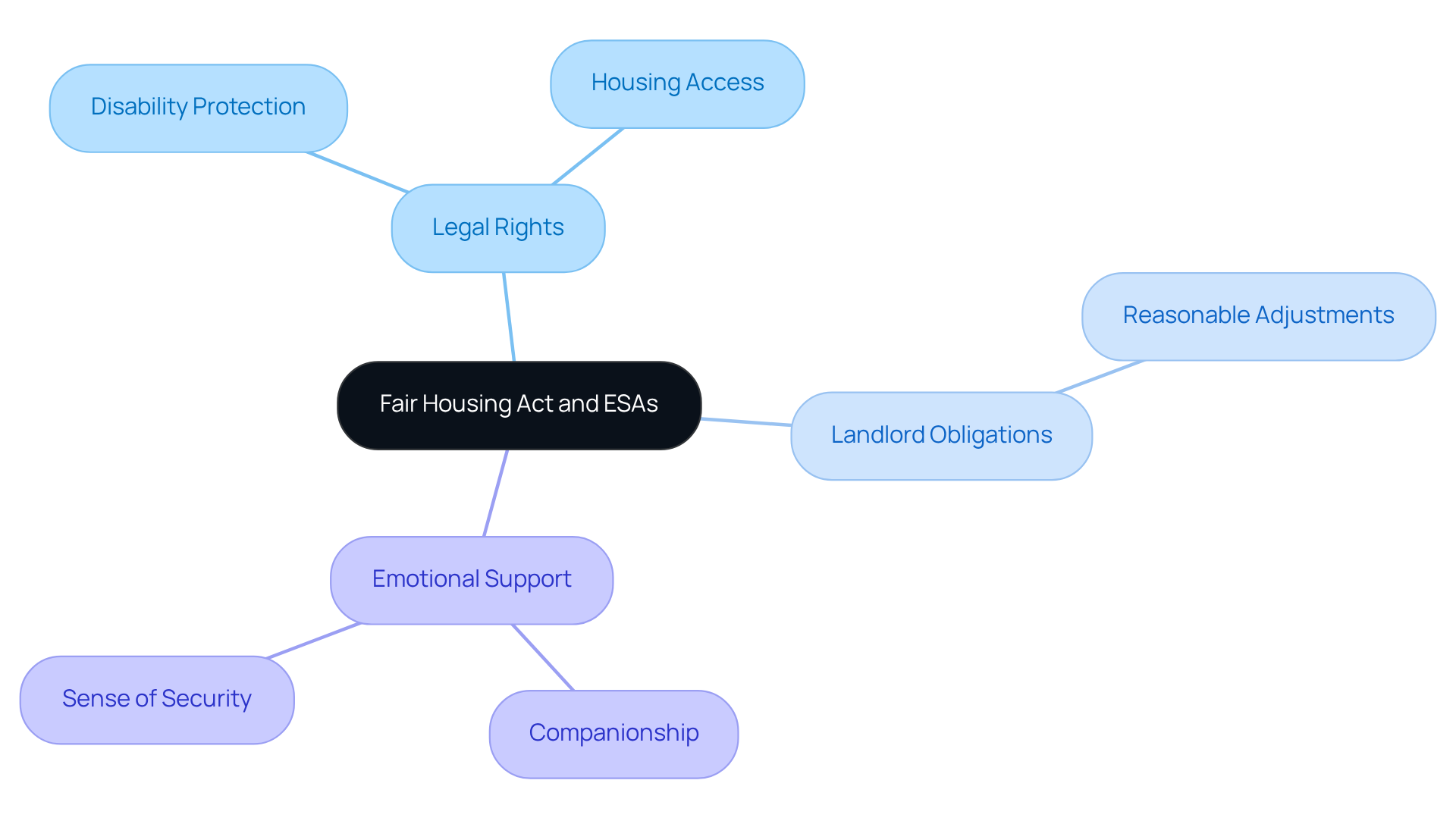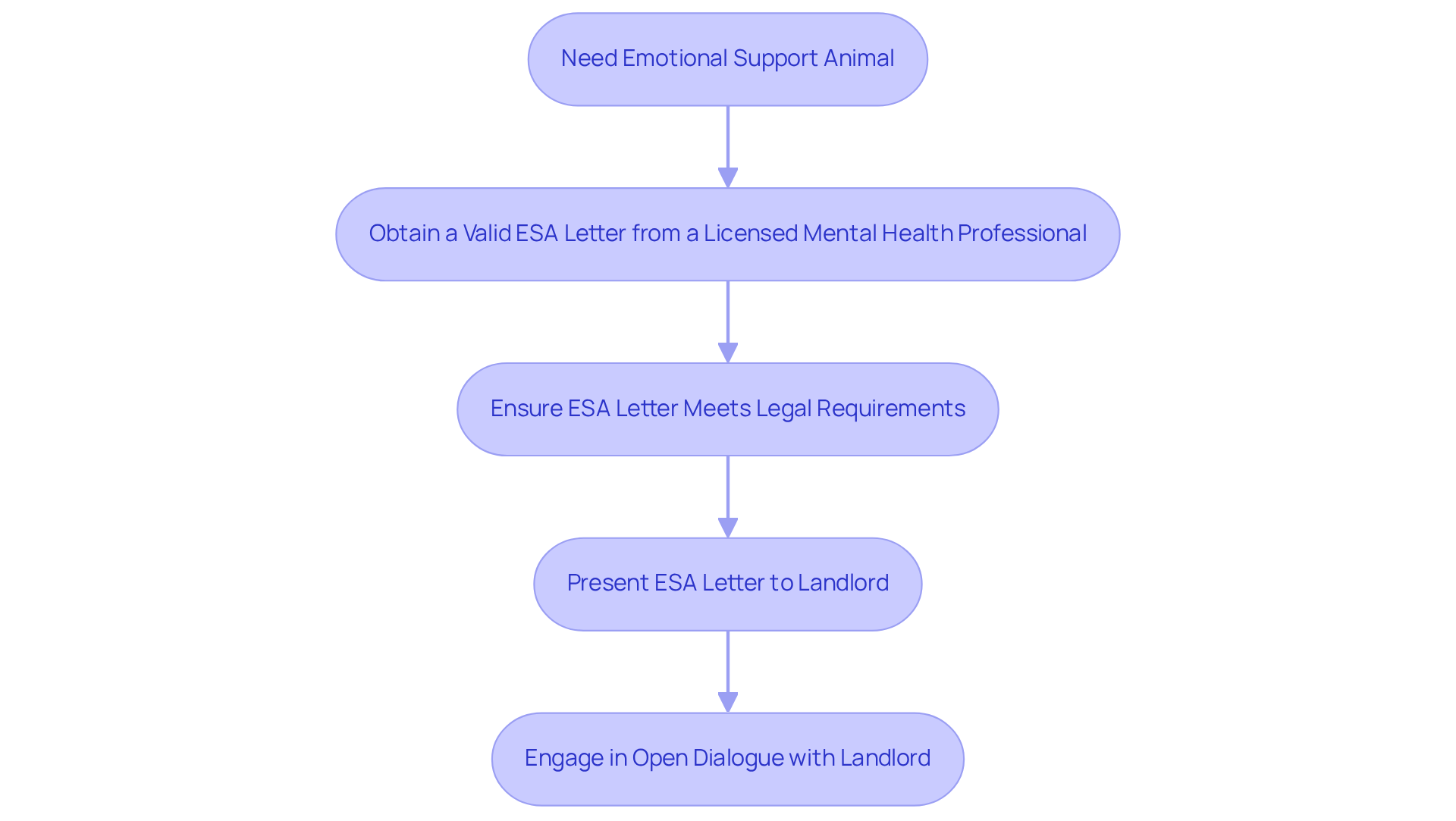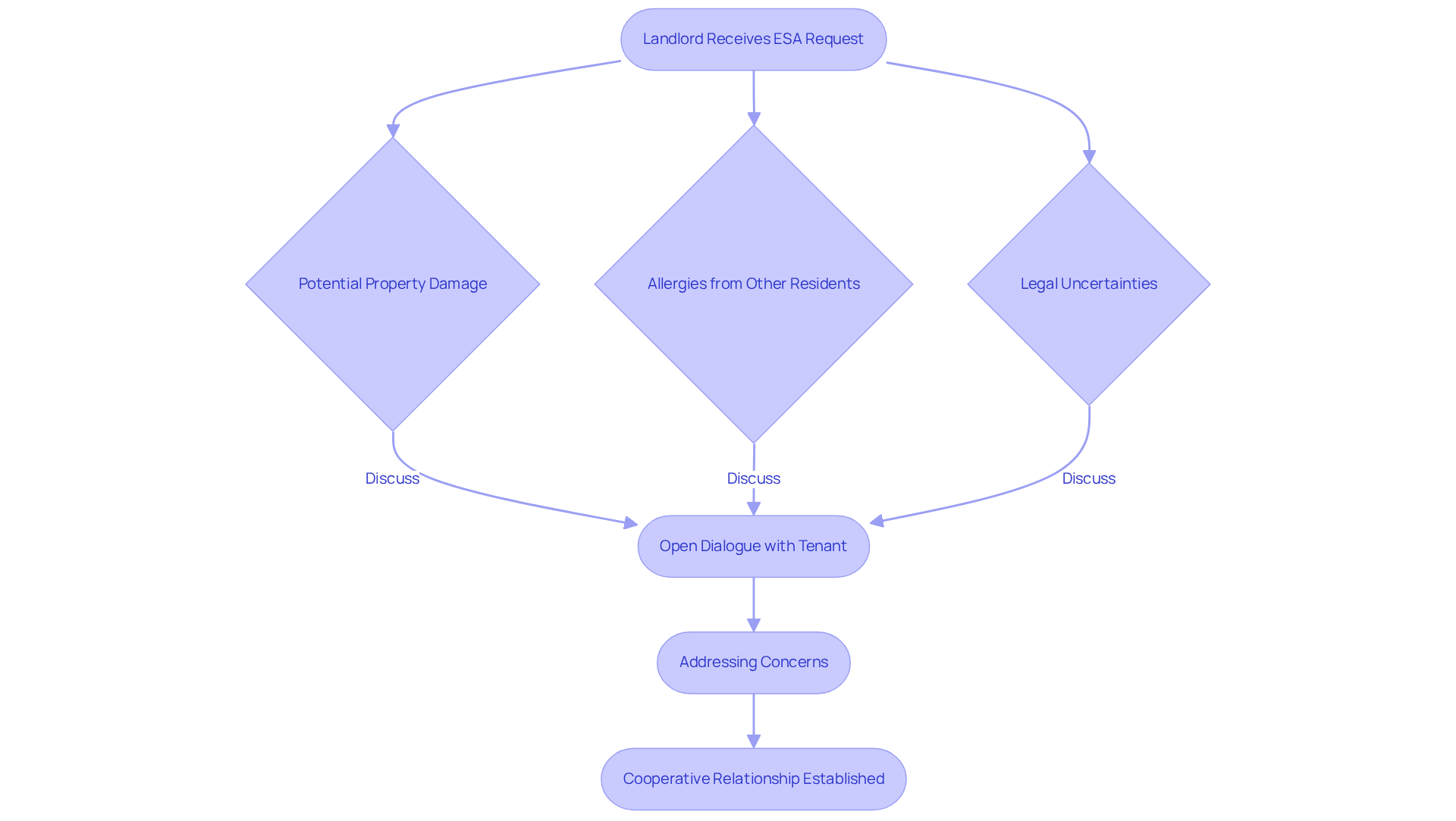

Do Landlords Have to Accept Emotional Support Animals? Key Insights
by Lena Park
Last updated: July 10, 2025
Verified and Approved by:
Angela Morris,
MSW, LCSW
Fact Checked

Overview
Landlords are required to accept emotional support animals (ESAs) under the Fair Housing Act, as they must make reasonable accommodations for tenants who can demonstrate a valid need for their animal due to mental health conditions. This legal protection is not just a policy; it is a lifeline for individuals coping with emotional distress. It ensures that they can maintain their vital support systems while navigating the often overwhelming challenges of housing.
Imagine facing the daily struggles of mental health issues, feeling isolated and in need of companionship. The presence of an ESA can provide comfort and stability, making a significant difference in one’s quality of life. Emotional support animals offer more than just companionship; they serve as a critical source of emotional support that can help individuals manage their conditions more effectively.
It is essential to recognize the profound impact that an ESA can have on a person’s emotional well-being. The ability to live with a beloved animal can alleviate feelings of anxiety and loneliness, allowing individuals to thrive in their living environments. This connection between a person and their ESA is often what helps them feel grounded and supported.
If you or someone you know is struggling with mental health issues, consider the possibility of obtaining an ESA letter. This letter can serve as a compassionate solution, allowing you to keep your emotional support animal by your side in your home. Remember, you are not alone in this journey; support is available, and there are pathways to ensure that your emotional needs are met.
Introduction
Emotional Support Animals (ESAs) have become essential companions for individuals grappling with emotional and psychological challenges, offering much-needed comfort and stability in their daily lives.
As the legal landscape surrounding these beloved companions evolves, it is increasingly vital for both tenants and property owners to understand the obligations regarding their acceptance.
What occurs when the need for an emotional support animal intersects with housing regulations? How can both parties navigate this intricate relationship?
Exploring these questions unveils not only the rights of tenants under the Fair Housing Act but also the responsibilities and concerns that landlords must thoughtfully consider in accommodating these crucial emotional lifelines.
Understanding this dynamic can foster a supportive environment for all involved.
Define Emotional Support Animals: Purpose and Role
Emotional Support Animals serve as vital companions for individuals grappling with emotional or psychological distress. Unlike assistance animals, which undergo specialized training to perform tasks for those with disabilities, emotional support animals do not require such training. Their primary purpose is to offer comfort and alleviate symptoms associated with mental health conditions like anxiety, depression, and PTSD. The bond between a person and their ESA can significantly enhance emotional stability, making these animals essential for many in navigating their mental health journey.
Many people find solace in the companionship of ESAs, especially in the form of dogs and cats, which are the most common due to their availability and innate ability to forge strong emotional connections with humans. Recent studies indicate that around 70% of individuals utilizing emotional support animals report improvements in their mental health, underscoring the importance of these companions in therapeutic settings. Mental health professionals emphasize that the presence of an ESA can be crucial for those managing challenges that might otherwise diminish their quality of life.
Real-life stories abound, showcasing how emotional support animals have positively impacted individuals with PTSD, assisting them in handling daily challenges and enhancing their overall quality of life. It’s also important to note that under the Fair Housing Act, landlords are required to consider do landlords have to accept emotional support animals by making reasonable accommodations for residents, which may include allowing these companions in housing situations where pets are typically prohibited.
Wellness Wag facilitates access to ESA letters within 24 hours, having supported over 50,000 patients, which reinforces the reliability and efficiency of their services. As one satisfied client, Linda S., shared, “Applying for an ESA through Wellness Wag was the best decision I made. It was an effortless process and the team was very professional.” This testimonial exemplifies the exceptional service and prompt approval that clients can expect when collaborating with Wellness Wag, providing reassurance and support for those in need.
Explore Legal Rights: The Fair Housing Act and ESAs
The Fair Housing Act (FHA) serves as a vital federal law that protects individuals from discrimination in housing based on disability. For those navigating the challenges of mental health, the presence of emotional support animals (ESAs) can be a source of comfort and stability. Under this important act, individuals with emotional support creatures are afforded specific rights, enabling them to live alongside their beloved companions, even in housing that typically enforces pet restrictions.
A key consideration is whether landlords have to accept emotional support animals, as they are required to make reasonable adjustments for tenants with ESAs, provided that the tenant can demonstrate a valid necessity for the animal as part of their mental health care. This legal protection is not just a formality; it is essential for individuals who may struggle to secure housing due to their mental health conditions. It ensures that they can maintain their emotional support systems, fostering a sense of security and well-being.
Consider the emotional challenges faced by those dealing with mental health issues. The journey can often feel isolating and overwhelming. Yet, the presence of an ESA can make a significant difference, offering companionship and unconditional love. Knowing that the law supports their right to have these animals by their side can provide reassurance and hope about whether landlords have to accept emotional support animals.
In conclusion, the Fair Housing Act stands as a compassionate solution for those in need, ensuring that individuals can uphold their emotional support systems in the face of adversity. It is a reminder that support is available, and no one has to face their struggles alone.

Outline Tenant Responsibilities: Documentation and Compliance
For tenants seeking to retain an emotional support companion, it’s essential to provide the appropriate documentation to landlords, especially to clarify if landlords have to accept emotional support animals. This typically involves a valid ESA letter from a licensed mental health professional, outlining the individual’s need for the companion as part of their treatment plan. It’s important for residents to ensure that their ESA letter meets legal requirements and clearly expresses the therapeutic benefits of the animal. Engaging in open and honest dialogue with landlords can help address any concerns, such as if landlords have to accept emotional support animals, and promote adherence to property regulations, all while upholding their rights under the Fair Housing Act.
Navigating the complexities of mental health can be challenging, and having an emotional support companion can make a significant difference. These companions provide comfort and stability, helping individuals cope with their emotional struggles. By presenting a well-documented ESA letter, tenants can advocate for their needs and foster understanding with their landlords. Remember, you are not alone in this journey; support is available, and your well-being is important.

Examine Landlord Challenges: Navigating ESA Requests
Navigating requests for emotional support animals can be a challenging journey for landlords, particularly when considering if landlords have to accept emotional support animals. They often grapple with concerns about potential property damage, allergies from other residents, and the delicate balance of respecting the rights of all who live in the community. Moreover, some landlords may feel uncertain about whether landlords have to accept emotional support animals, which can lead to confusion or hesitation in accommodating these heartfelt requests.
It’s important for renters to approach these discussions with understanding, providing clear documentation and being open to addressing any concerns the landlord might have. By fostering a cooperative relationship, both parties can work towards a smoother process. This not only allows tenants to enjoy the companionship and comfort of their emotional support animals but also reassures landlords about their responsibilities in property management.
Remember, open dialogue and empathy can bridge the gap, creating a supportive environment for everyone involved.

Conclusion
Emotional Support Animals (ESAs) hold an essential place in the lives of those grappling with emotional or psychological distress, offering comfort and stability during difficult times. Their importance is highlighted by the legal protections provided under the Fair Housing Act, which requires landlords to consider reasonable accommodations for tenants needing these companions. This legal framework plays a crucial role in helping individuals maintain their emotional support systems, nurturing a sense of security and well-being.
As we reflect on the necessity of ESAs, it’s vital to recognize the rights individuals possess under the Fair Housing Act, alongside the responsibilities they must fulfill, such as providing valid documentation. Additionally, the challenges landlords encounter in accommodating ESA requests are significant, underscoring the need for open communication and understanding between tenants and landlords. This collaboration is essential in fostering a supportive living environment.
Ultimately, the presence of emotional support animals transcends mere companionship; it is a fundamental aspect of mental health support. As society increasingly acknowledges the significance of mental health, it becomes imperative for both tenants and landlords to navigate this landscape with empathy and respect. By grasping the legal rights and responsibilities surrounding emotional support animals, we can all contribute to a more inclusive and nurturing community.
How can we, together, ensure that everyone feels supported on their journey towards emotional well-being?
Frequently Asked Questions
What are Emotional Support Animals (ESAs)?
Emotional Support Animals are companions that provide comfort and alleviate symptoms associated with emotional or psychological distress, such as anxiety, depression, and PTSD. They do not require specialized training like assistance animals.
How do ESAs differ from assistance animals?
Unlike assistance animals, which are trained to perform specific tasks for individuals with disabilities, ESAs do not undergo specialized training. Their primary role is to offer emotional support and companionship.
What types of animals are commonly used as ESAs?
Dogs and cats are the most common types of Emotional Support Animals due to their availability and their ability to form strong emotional connections with humans.
What benefits do individuals report from having an ESA?
Studies indicate that around 70% of individuals utilizing emotional support animals report improvements in their mental health, highlighting the positive impact these companions have in therapeutic settings.
How do ESAs assist individuals with mental health challenges?
ESAs can help individuals manage daily challenges related to their mental health conditions, significantly enhancing their overall quality of life.
Are landlords required to accept Emotional Support Animals?
Yes, under the Fair Housing Act, landlords must consider making reasonable accommodations for residents with Emotional Support Animals, even in situations where pets are typically prohibited.
How can one obtain an ESA letter?
Wellness Wag facilitates access to ESA letters within 24 hours and has supported over 50,000 patients, offering a reliable and efficient service for those in need of an ESA.
What do clients say about Wellness Wag’s services for obtaining an ESA?
Clients, such as Linda S., have shared positive experiences, describing the process as effortless and praising the professionalism of the team at Wellness Wag.
Certify Your Emotional Support Animal Today

Why You Can Rely on Us?
At Wellness Wag, we believe your pet deserves care rooted in both science and compassion. Each article is carefully researched, written in clear language for pet owners, and then reviewed by qualified professionals to ensure the information is evidence-based, current, and practical for real-life care. Our goal is to help you feel confident in making informed decisions about your pet’s health and well-being.
Reviewed by
Angela Morris, MSW, LCSW
Angela is a licensed clinical social worker with 20 years of experience in patient advocacy and community mental health. She has assisted numerous clients with ESA evaluations and brings a deep understanding of disability accommodations, ensuring that all information is accurate, supportive, and practical.

Written by :
Lena Park
Last Updated :
July 10, 2025












